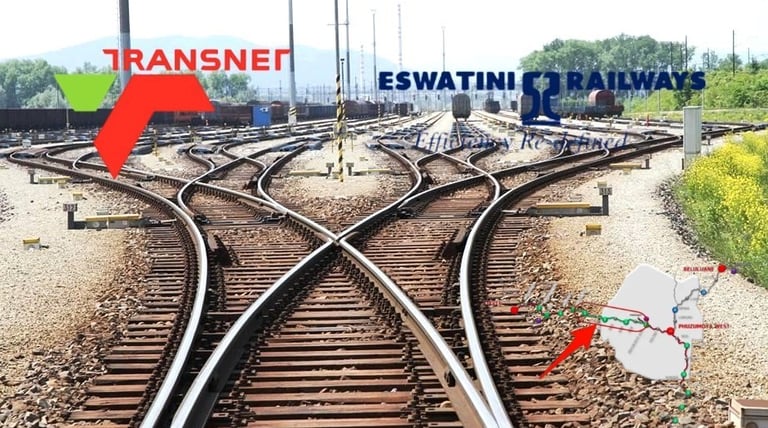Transnet Freight Rail and Eswatini Rail Launch 146km Cross-Border Extension
The Transnet Freight Rail and Eswatini Rail joint project is a 146-kilometer rail extension from Sidvokodvo, Eswatini, to the South African border. It will double freight traffic, enhance cross-border trade, and improve logistics efficiency between South Africa and Mozambique’s Maputo harbor. With a daily capacity of 12 trains each way, it offers a faster, greener alternative to road transport, boosting regional economic growth.
RAILWAY TRANSPORTATIONLOGISTICS
Teresa Ndlovu
10/11/20242 min read


Eswatini Railways plays a vital role in the movement of freight logistics within Southern Africa, serving as a critical conduit for goods passing through Eswatini en route to the key ports of Durban. The strategic location of Eswatini within the regional logistics network makes it an essential player in facilitating cross-border trade, particularly for industries relying on efficient rail access to international markets.
In a significant development aimed at bolstering the region’s rail infrastructure, Transnet Freight Rail (TFR) and Eswatini Railways have launched a joint rail extension project. This ambitious initiative seeks to enhance the current capacity and efficiency of freight transportation across borders, addressing long-standing bottlenecks in Southern Africa’s logistics network.
The new rail line will originate in Sidvokodvo, a key hub for Eswatini's freight network, and extend to the South African border. This 146-kilometer extension is designed to provide a seamless connection from Eswatini to the northern regions of Mozambique, allowing faster, more efficient rail shipping from industrial areas in Gauteng and other parts of South Africa to the bustling Maputo harbor. This harbor is a critical gateway for exports, particularly bulk commodities such as coal, iron ore, and agricultural products.
One of the notable features of the new line is its daily capacity. The project envisions the operation of 12 trains each way, with each train capable of hauling up to 81 wagons. This operational capacity is set to significantly increase the current freight volumes on the existing Eswatini Rail Komatipoort-Golela line. With this new link, rail traffic volumes through Eswatini are expected to double, drastically improving regional trade efficiency and easing pressure on road freight, which has been a cause for congestion and increased costs in the region.
Contrary to expanding capacity, the project will streamline logistical operations between South Africa, Eswatini, and Mozambique, cutting down transit times and improving the competitiveness of rail freight over road transport. This will not only reduce costs for businesses but also contribute to reducing carbon emissions in line with global sustainability goals, as rail transport is inherently more energy-efficient than road.
The TFR-Eswatini Rail project is more than just a rail extension—it's a catalyst for economic growth in Southern Africa. By providing faster and more efficient access to ports, the project is poised to attract increased investment in industries reliant on export, such as mining and agriculture, further cementing the region's role as a key player in the global supply chain.
Future
© 2025. All rights reserved.


